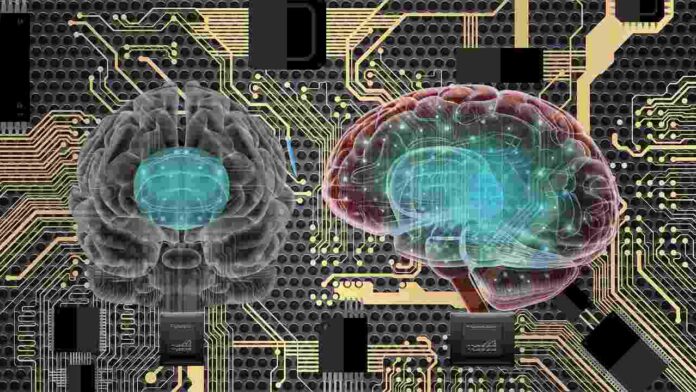In a groundbreaking development, tech billionaire Elon Musk’s company, Neuralink, has successfully implanted a wireless brain chip into a human for the first time. This significant milestone marks a major leap forward in the field of neurotechnology and holds immense potential for revolutionizing the way we interact with computers and assist individuals with neurological conditions.
The Birth of Neuralink
Founded in 2016, Neuralink aims to bridge the gap between humans and artificial intelligence by developing advanced brain-computer interfaces. The company’s vision is to enable individuals to control devices and communicate directly with computers using only their thoughts. Elon Musk’s ambition for Neuralink is to enhance human cognition, address neurological disorders, and eventually achieve a symbiotic relationship with AI.
The First Human Implant
Elon Musk took to his social media platform, X (formerly Twitter), to announce the successful implantation of a Neuralink device into a human patient. According to Musk, the patient is recovering well, and initial results show promising neuron spike detection—a key indicator of the device’s efficacy in capturing brain activity.
The wireless Neuralink device consists of a chip and electrode arrays with over 1,000 superthin, flexible conductors. These electrodes are surgically inserted into the cerebral cortex, specifically targeting areas related to motion. The goal is to decode the electrical signals generated by the brain and translate them into commands for controlling computers and other devices.
Telepathy: The First Product
Neuralink’s first product, aptly named Telepathy, aims to empower individuals with limited mobility or those who have lost the use of their limbs. This revolutionary technology enables users to control their phones, computers, and other devices through their thoughts alone. Elon Musk envisions a future where individuals like Stephen Hawking can communicate faster than expert typists or auctioneers, breaking down barriers and enhancing human potential.
Human Trials and Regulatory Approvals
Neuralink’s journey to the first human implant involved rigorous testing and regulatory approvals. In May 2023, the company received approval from the US Food and Drug Administration (FDA) to conduct human clinical trials. Last year, Neuralink began recruiting patients with quadriplegia resulting from cervical spinal cord injuries or amyotrophic lateral sclerosis (ALS) for its trial.
The FDA’s approval marked a significant milestone for Neuralink and attracted considerable interest from individuals eager to participate in the groundbreaking research. Thousands of prospective patients volunteered to have a portion of their skull removed and the Neuralink implant inserted.
Competing in the Neurotechnology Landscape
While Neuralink’s achievement is groundbreaking, it is not the only company striving to develop brain-computer interfaces and advance the field of neurotechnology. Other notable players in the industry, such as Blackrock Neurotech and Synchron, have also made significant progress in implanting devices into human brains.
Neuralink’s success in neuron spike detection is a positive sign, but the company will need to demonstrate its capability to outperform competitors in areas such as data transmission and integration with external devices. Each company brings unique approaches and technologies to the table, contributing to the collective advancement of neurotechnology.
Ethical Considerations and Animal Testing
Neuralink’s extensive animal testing has drawn attention and raised concerns among some animal rights groups. The company’s experiments, which involved monkeys playing computer games using their brains alone, have sparked discussions about the ethical implications of such research.
It is essential to balance the potential benefits of neurotechnology with ethical considerations regarding the welfare of animals involved in research. Striking a balance between scientific progress and ethical responsibility remains a critical aspect of advancing the field of neurotechnology.
The Long Road Ahead
Although Neuralink’s successful human implant is an impressive feat, it is essential to recognize that the development of a commercial brain implant is a complex and time-consuming process. Neuralink’s wireless chips aim to penetrate a few millimeters into the brain, deeper than many other existing systems. This depth requires meticulous research, development, and testing to ensure the safety and effectiveness of the implants.
First-in-human trials typically involve enrolling a small number of participants and can take several months. Following successful initial trials, feasibility studies and pivotal studies are conducted to gather more data and refine the technology. Neuralink has plans to perform eleven surgeries in 2024, which highlights the extensive research and development roadmap ahead.
Balancing Hype and Realistic Expectations
Elon Musk is known for his ambitious vision and groundbreaking endeavors, but it is crucial to balance enthusiasm with realistic expectations. While the Neuralink implant represents a remarkable achievement, it is necessary to avoid overhyping the technology. As Neuralink advisor Jaimie Henderson, a neurosurgery professor at Stanford University, points out, the road to an approved commercial device will still take several years of research, refinement, and regulatory approvals.
A Glimpse into the Future
Neuralink’s groundbreaking achievements in neural interfaces provide a glimpse into a future where humans and machines can communicate seamlessly through thoughts alone. While challenges and ethical considerations remain, the potential benefits of this technology are immense. From assisting individuals with neurological conditions to enhancing human cognition, Neuralink’s innovations hold the promise of transforming lives and pushing the boundaries of human-machine interaction.
As Neuralink continues its groundbreaking research and development, the world eagerly awaits further advancements in the field of neurotechnology. The fusion of human intelligence with artificial intelligence may soon become a reality, unlocking unimaginable possibilities and propelling humanity into a new era of technological innovation.
